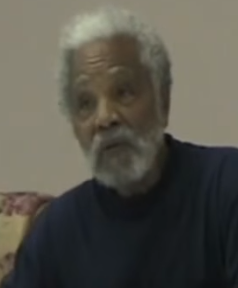
Ernie Chambers
: Photo from Wikimedia Commons / Author of Photo: Scott BlakeOverview
* Longtime member of the Nebraska state legislature
* Believes that Western civilization is rooted in oppression, white supremacy, and racism
* Holds whites and Jews in contempt
Born on July 10, 1937 in Omaha, Nebraska, Ernest “Ernie” William Chambers graduated from Creighton University in 1959 with a BA in history. Two years later, the U.S. Post Office in Omaha, where Chambers was employed, informed the FBI that the young man was possibly a follower of Nation of Islam leader Elijah Muhammad. This prompted the Bureau to create a file on Chambers that would remain open for a decade.
Soon after the Post Office fired Chambers for insubordination in 1963, he picketed a speech by the Postmaster General with a sign that read, “I spoke against discrimination in the Omaha Post Office and was fired.”
Chambers subsequently found work as a barber. He also enrolled at the Creighton University School of Law in the early 1960s but did not earn his JD until 1979. He subsequently refused to join the Nebraska State Bar Association, however, and thus never became a practicing attorney.
In the mid-1960s Chambers was outspoken in urging blacks to pursue racial justice by any means necessary, including armed combat. He appeared in the 1966 documentary film A Time for Burning, where he talked about race relations in Omaha.
In July and August of 1966, the city of Omaha was overrun by two separate outbreaks of black street riots that lasted for several days apiece. On both occasions, Chambers served as a spokesman for the rioters and their community, negotiating concessions on their behalf from the city’s leaders. He also headed a Police-Community Relations Council committee that presented to city officials a long list of black residents’ complaints about police practices.
In early 1968 Chambers told the Kerner Commission, which President Lyndon Johnson had convened to study the root causes of the race riots that had struck numerous American cities in recent years, that black Omahans would be justified in burning their racist city to the ground.
Unaffiliated with any political party, Chambers in 1970 was elected to represent Omaha’s mostly-black 11th District (known as the Near North Side) in the Nebraska state legislature. He served continuously until 2008, at which time he was barred from seeking re-election by a recently passed constitutional amendment limiting Nebraska lawmakers to two consecutive four-year terms. The amendment, however, permitted senators to return to the political arena after sitting out for four years, and in 2012 Chambers won back his seat in the legislature.
A firm believer that Western civilization is rooted in oppression, white supremacy, and racism, Chambers emphasizes that he personally feels “a loyalty to black people—not to this state” or to its government. In 1997 he explained that “a lot of what I do in this legislature is symbolic,” adding: “It’s to show us that one black man can stand against and among all these white people. Don’t walk like ’em, talk like ’em, dress like them, do anything like they do, and yet compel them to knuckle under on issues.”
On another occasion, Chambers voiced his deep contempt for whites and Jews: “You know how we as kids would say how you can tell the difference between a Jew and a white person? Because white people are mean and Jews are stingy. If a person’s stingier than he is mean, then he’s a Jew. If he’s meaner than he is stingy, he’s white.”
In 1980 Chambers initiated a lawsuit aiming to end the Nebraska legislature’s practice of beginning its session with a prayer recited by a state-supported chaplain. Chambers argued that the Establishment Clause of the First Amendment forbade such a practice. The Supreme Court eventually ruled in 1983 that the opening prayer was constitutional.
An unwavering opponent of the death penalty, Chambers has introduced bills to repeal Nebraska’s capital punishment law at the start of every legislative session in which he has participated since 1973. In 2006 he voted in favor of permitting illegal immigrants residing in Nebraska to attend a public college in that state for the same discounted tuition rate that was traditionally available only to legal residents of the state. And in 2014 Chambers voted in favor of raising the minimum wage and expanding eligibility for Medicaid in Nebraska. For additional information on Chambers’s voting record on an array of key issues, click here.
During a legislative hearing on March 20, 2015, Chambers condemned white police officers generally as racists who are “licensed to kill us,” likening them to murderous terrorists: “My ISIS is the police…. Nobody from ISIS ever terrorized us [blacks] as a people, as the police do us daily.” “If I was going to carry a weapon,” he added, “it wouldn’t be against you, it wouldn’t be against these people who come here that I might have a dispute with. Mine would be for the police. And if I carried a gun I’d want to shoot him first and then ask questions later, like they say the cop ought to do.”
For additional information on Ernie Chambers, click here.